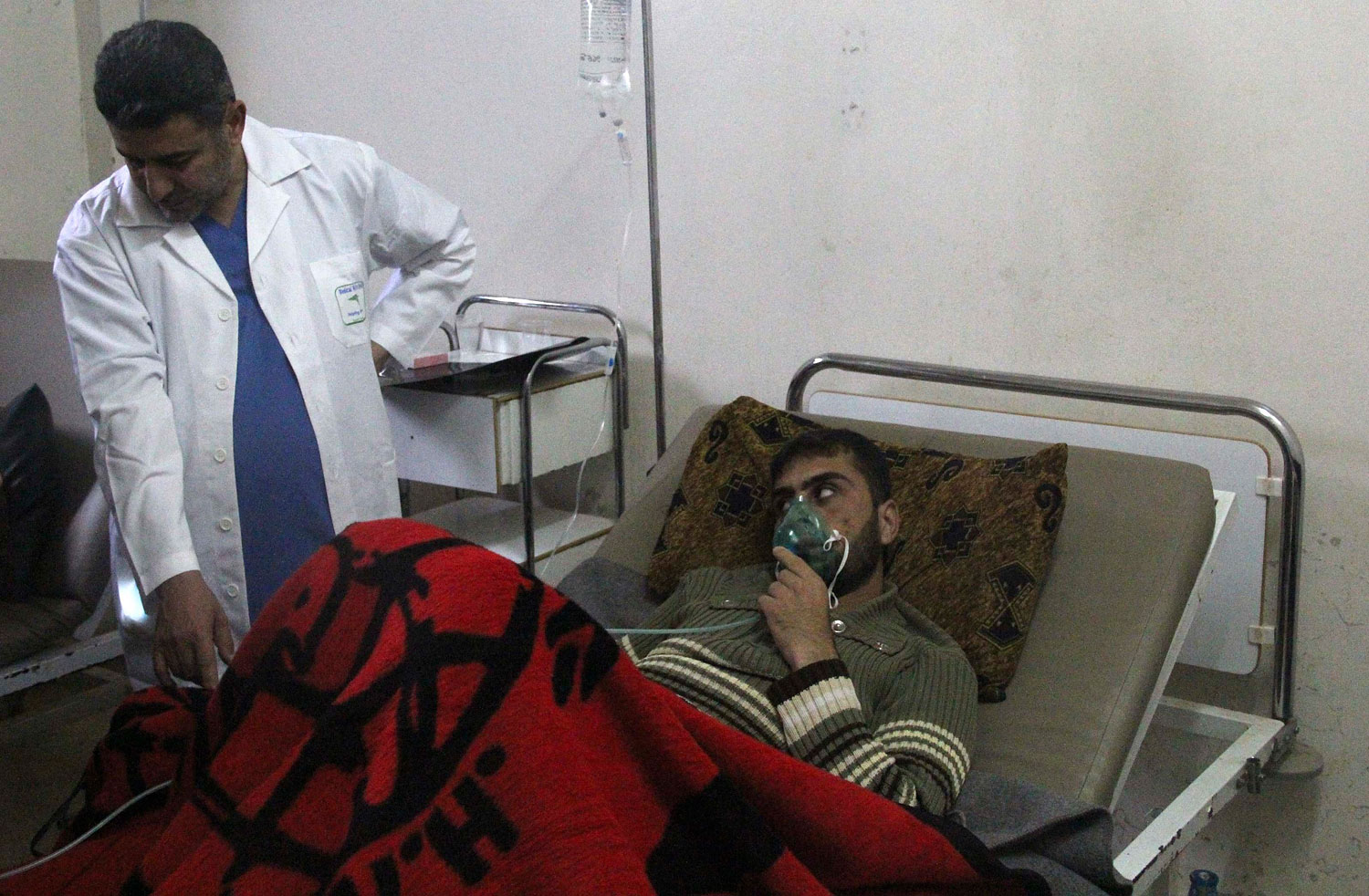
It’s not often that the Syrian regime and opposition groups fighting for its downfall can agree on something. But when it comes to the alleged April 11 chemical attack on the rebel-held village of Kfar Zeita, neither side has any doubt it happened. What they can’t agree upon is who is to blame. Video footage taken from a local field hospital and published online by anti-regime activists shows scenes of chaos and terror, as harried medical workers pass oxygen masks around a crowded room and struggle to revive pale, listless patients lying on the floor between hospital gurneys. Toddlers, stacked four to a bed, cough and scream in fear if they aren’t laying unnaturally still. It is impossible to tell for certain what happened, but existing footage indicates some sort of chemical agent may have been involved. “A helicopter came and dropped a container,” says anti-regime activist Abdallah Abu Raed via Skype from Kfar Zeita, describing the scene on Friday. “A sort of yellow dust spread in the sky and coated everything. You can’t really distinguish the smell because as soon as you inhale it you pass out.” The noxious substance affected some 150 people, he says, and by Monday afternoon, several victims had been transferred to neighboring Turkey for treatment. Two children and an old man had died, he says.
Within hours of the alleged attack, opposition leaders were blaming the Syrian government, saying the military had added chlorine gas to its by now habitual deployment of improvised barrel bombs full of explosives and shrapnel dropped from aircraft flying over rebellious civilian areas. The next day state-run television responded with reports that the al-Qaeda-affiliated al-Nusra Front had orchestrated the attacks, and that the rebel group was planning further attacks on other towns. The state-owned news agency did not say from where it had obtained the information, but on April 1 – ten days before the attack – Syria’s representative to the United Nations in New York, Bashar al-Jaafari, claimed that Syrian government authorities had intercepted phone calls between militant groups planning to launch chemical attacks in order to frame the government.
Taleb Abu al-Hasan, commander of the local 111 rebel regiment in Kfar Zeita, tells TIME via Skype that such pre-emptive accusations are standard government propaganda. “Whenever the regime is about to do this, they blame someone else ahead of time to deflect blame before the attack takes place.” The rebels, he adds, are bracing for a similar attack in the nearby town of Morek, “because the regime is saying that their intelligence has gathered evidence that al-Nusra is planning to use [chemical weapons] there.” The towns of Kfar Zeita and Morek have been thorns in the side of regime forces since the rebels seized them several months ago. They threaten a key supply line to military units vital for maintaining government control over the northern town of Aleppo, says al-Hasan, and that’s why he believes they are likely to be next of the regime’s hit-list. It’s simply too convenient, he suggests, that Morek, which is already under rebel control, is threatened by another chemical attack by the al-Nusra Front.
If past cases of alleged chemical attacks are anything to go by, there may never be definitive proof of culpability for the Kfar Zeita attack, or any subsequent attacks, for that matter. It may impossible to prove that any chemical agents were used it all. It took months for U.N. investigators to determine that a chemical weapons attack had actually taken place on Aug. 21 in the Damascus suburbs, even after hundreds had died from apparent symptoms of exposure to toxic substances. Even then investigators were not able to assign blame. Figuring out what happened in Kfar Zeita, about 200 km north of Damascus in contested territory, will be even more difficult given ongoing war, the region’s inaccessibility and the unwillingness of either side to let go of the propaganda opportunities presented by continued ambiguity.
The U.S., for the moment, has been cautious in assigning blame. “We are trying to run this down,” Samantha Power, the U.S. ambassador to the United Nations, said on the U.S. weekly television news program ‘This Week.’ “So far, it’s unsubstantiated, but we’ve seen, I think, in the past that we will do everything in our power to establish what has happened and then consider possible steps in response.”
Of course, “possible steps” are likely to be limited. Under a deal brokered by ally Russia, President Bashar Assad agreed to give up Syria’s substantial chemical arsenal by June 30 in order to avert a U.S. military response in the wake of the August attack. (The Syrian regime blamed the rebels for that attack as well). And the U.S. and its Western allies may not want to issue fresh threats against the Assad regime now that Syria is on the brink of reaching the goal of relinquishing its chemical weapons — today the organization overseeing Syria’s compliance, the Organization for the Prohibition of Chemical Weapons, announced that 65 percent of Syria’s chemical stockpiles had been removed from the country. “All of these countries have a vested interest in seeing Syria disarmed,” says chemical weapons expert Jean Pascal Zanders. “Right now that is the biggest priority, which is why I am thinking no one will want to rock the boat over this issue right now.”
With reporting by Hania Mourtada / Beirut
More Must-Reads From TIME
- The 100 Most Influential People of 2024
- Coco Gauff Is Playing for Herself Now
- Scenes From Pro-Palestinian Encampments Across U.S. Universities
- 6 Compliments That Land Every Time
- If You're Dating Right Now , You're Brave: Column
- The AI That Could Heal a Divided Internet
- Fallout Is a Brilliant Model for the Future of Video Game Adaptations
- Want Weekly Recs on What to Watch, Read, and More? Sign Up for Worth Your Time
Contact us at letters@time.com